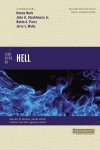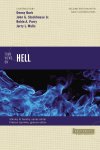Four Views on Hell presents a point-counterpoint debate between advocates of the three main interpretations of the doctrine of hell among evangelical theologians. Denny Burk makes the case for “eternal conscious torment,” John G. Stackhouse Jr. for “terminal punishment,” and Robin A. Parry for “universal salvation.” Jerry L. Walls’ argument for a Protestant version of Purgatory rounds out the “four views,” but while interesting, it is out of place in this book, since Purgatory—whether in its Catholic or Protestant version—is heaven’s antechamber, not hell’s.
In his argument for hell as eternal conscious torment, Burk begins by telling a “parable” about a how people would respond if they came across a man pulling the legs off a grasshopper, frog, bird, puppy, or baby. Most people would respond with increasing horror to these incidents, and that horror would increase their desire to intervene in the situation. Burks argues that this parable demonstrates “the seriousness of sin is not measured merely by the sin itself…but by the value and the worth of the one being sinned against” [emphasis in original]. That is why “to sin against an infinitely glorious being [i.e., God] is an infinitely heinous offense that is worthy of an infinite heinous punishment.”
Burk recognizes that this parable represents a “theological conjecture” not explicitly taught in Scripture (though consistent with it). So the bulk of his argument identifies ten key biblical texts that “deal explicitly with hell and with the final state of the wicked”: Isaiah 66:22–24; Daniel 12:2–3; Matthew 18:6–9, 25:31–46; Mark 9:42–48; 2 Thessalonians 1:6–10; Jude 7, 13; Revelation 14:9–11; and 20:10, 14–15. He argues that each of these texts presents hell as “final separation” from God, “unending experience,” and “just retribution.” Burk nowhere appeals to the immortality of the soul in his argument. Instead, in his discussion of the Isaiah passage, he infers that “this scene seems to assume that God’s enemies have been given a body fit for an unending punishment.”
Stackhouse makes the case for what he calls “terminal punishment,” which is also known as “conditionalism,” “conditional immortality,” and “annihilationism.” Stackhouse’s term, it seems to me, is more apt than these others because it clearly identifies both the nature (punishment) and duration (terminal) of hell in distinction from the eternal conscious torment position.
The core of his biblical argument focuses on the meanings of the words eternal, destroy, and death. Regarding the first word, Stackhouse distinguishes “an event or action that occurs for only a segment of time” and “the result of that event or action.” Advocates of eternal conscious torment believe hell is eternal in the first sense, the segment of time being everlasting. Stackhouse argues, however, that it is the result that matters. “Eternal punishment” is not an eternal process of being punished but a terminal punishment that has eternal consequences. He goes on to argue that second and third words “speak of the destiny of the lost as termination, end, disappearance, eradication, annihilation, and vanishing.” Such terminal punishment rules out the doctrine of the soul’s immortality. Stackhouse also discusses terminal punishment in terms of the finite duration of Christ’s death on the cross and of the goodness of God.
Parry makes the case for universal salvation, “the view that in the end God will reconcile all people to himself through Christ.”. This is “not some new-fangled liberal theology,” he writes, but rather “an ancient Christian theological tradition that in the early church stood alongside annihilation and eternal torment as a viable Christian opinion.” It should be distinguished from the version of universalism that teaches all religions are salvific. It is Christocentric, not pluralistic.
Parry argues that “a universalist doctrine of hell makes good sense” of “the biblical metanarrative, the grand story that runs from Genesis to Revelation”: creation, fall, redemption, and consummation. He cites Colossians 1:16–20 as one of many examples of what he takes to be universalist reasoning. He also responds to prooftexts commonly interpreted to be anti-universalistic: Mark 9:42–50; Matthew 25:31–46; 2 Thessalonians 1:5–10; Revelation 14:9–11, and 20:10–15. If God finally saves all in Christ, then what is hell? It is “judgment followed by restoration” [emphasis in original]. It is ultimately “restorative,” even if “retributive” for a time. Obviously, universalism requires a commitment to “post-mortem salvation,” which Parry acknowledges is consistent with Scripture, though not taught explicitly by it.
Of these three views, eternal conscious torment is the majority tradition of Christianity, while terminal punishment and universal salvation are minority voices. Each position can find advocates in the first few centuries of the church’s existence, but each one is exclusive of the others. If one is right, in other words, the other two are wrong.
My goal in this review is simply to introduce the main positions in the current debate. I would like to register one more caveat, however. (The first was that Walls’ argument for Purgatory was out of place in this debate.) The second also relates to Walls. Burk presents one version of the traditional view of hell, in which eternal conscious torment is warranted because sin is an offense against an infinite God. In other writings—especially Hell: The Logic of Damnation and Heaven, Hell, and Purgatory—Walls offers a different warrant for hell based on human choice. Picking up on C. S. Lewis’ remark that the door to hell is locked from the inside, Walls argues that hell is eternal because its inhabitants refuse to repent. This is the fourth view of hell that should’ve been presented in this book.
Still, Four Views on Hell is a useful one-volume introduction to the state of the debate about hell among self-identified evangelical theologians. Its point-counterpoint format helps readers see both what the arguments and counterarguments are for each position. Although frustrating, working through the best arguments and deepest critiques of each position can result in readers developing a more informed biblical, theological, and philosophical understanding of this important doctrine.
 Book Reviewed
Book Reviewed
Preston Sprinkle, ed., Four Views on Hell, 2nd ed. (Grand Rapids, MI: Zondervan, 2016).
P.S. If you liked my review, please click “Helpful” on my Amazon review page.

